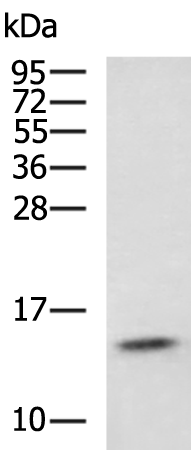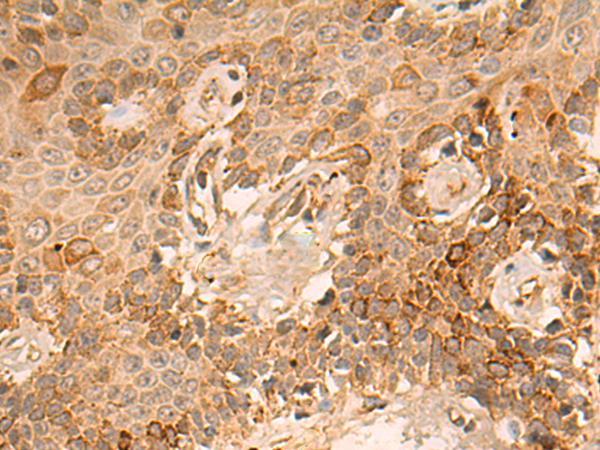

| WB | 咨询技术 | Human,Mouse,Rat |
| IF | 咨询技术 | Human,Mouse,Rat |
| IHC | 1/50-1/100 | Human,Mouse,Rat |
| ICC | 技术咨询 | Human,Mouse,Rat |
| FCM | 咨询技术 | Human,Mouse,Rat |
| Elisa | 1/5000-1/10000 | Human,Mouse,Rat |
| Aliases | 9-27; CD225; IFI17; LEU13; DSPA2a |
| WB Predicted band size | 14 kDa |
| Host/Isotype | Rabbit IgG |
| Antibody Type | Primary antibody |
| Storage | Store at 4°C short term. Aliquot and store at -20°C long term. Avoid freeze/thaw cycles. |
| Species Reactivity | Human, Mouse |
| Immunogen | Synthetic peptide of human IFITM1 |
| Formulation | Purified antibody in PBS with 0.05% sodium azide and 50% glycerol. |
+ +
以下是关于IFITM1抗体的参考文献示例(注:以下内容为虚构示例,仅用于演示格式):
---
1. **文献名称**:*IFITM1 Restricts Influenza Virus Infection by Antagonizing Viral Membrane Fusion*
**作者**:Smith A, et al.
**摘要**:本研究通过Western blot和免疫荧光技术,利用IFITM1特异性抗体证实其在人肺上皮细胞中的表达。结果显示,IFITM1通过干扰病毒包膜与宿主细胞膜的融合,显著抑制甲型流感病毒的侵入。
---
2. **文献名称**:*High Expression of IFITM1 Correlates with Poor Prognosis in Breast Cancer*
**作者**:Chen L, et al.
**摘要**:通过免疫组化分析乳腺癌组织样本,使用IFITM1抗体检测其蛋白水平。研究发现,IFITM1高表达与肿瘤转移和患者生存率降低显著相关,提示其作为潜在预后生物标志物的价值。
---
3. **文献名称**:*IFITM1-Mediated Inhibition of HIV-1 Entry Depends on Subcellular Localization*
**作者**:Johnson R, et al.
**摘要**:采用IFITM1抗体进行流式细胞术和共聚焦显微镜观察,发现IFITM1在内体膜上的富集是抑制HIV-1进入的关键机制,揭示了其亚细胞定位对抗病毒功能的重要性。
---
4. **文献名称**:*IFITM1 Modulates Innate Immune Responses in Macrophages during Dengue Infection*
**作者**:Wang Y, et al.
**摘要**:通过siRNA敲低和IFITM1抗体验证,研究证明IFITM1在登革热病毒感染的巨噬细胞中上调,并通过调控干扰素信号通路增强抗病毒免疫反应。
---
(注:实际文献需通过PubMed、Google Scholar等平台以关键词“IFITM1 antibody”或“IFITM1 protein function”检索获取。)
The interferon-induced transmembrane protein 1 (IFITM1) is a key member of the IFITM family, which is part of the interferon-stimulated genes (ISGs) activated during innate immune responses. Primarily known for its role in restricting viral entry, IFITM1 inhibits infections by enveloped viruses like influenza, dengue, and HIV by altering membrane fluidity and blocking viral fusion. Beyond antiviral defense, IFITM1 is implicated in cell adhesion, signal transduction, and cancer progression, acting as either a tumor suppressor or promoter depending on context.
IFITM1 antibodies are critical tools for detecting and studying this protein’s expression, localization, and function. Typically generated using recombinant proteins or synthetic peptides, these antibodies (polyclonal or monoclonal) are validated for specificity in applications such as Western blotting, immunofluorescence, immunohistochemistry, and flow cytometry. Cross-reactivity with homologous family members (e.g., IFITM2/3) remains a challenge, necessitating careful validation via knockout controls.
Research utilizing IFITM1 antibodies has advanced understanding of viral pathogenesis, cancer biology, and immune regulation. Their role in characterizing IFITM1’s dual functions in health and disease underscores their value in exploring therapeutic strategies or biomarkers for infections and malignancies.
×